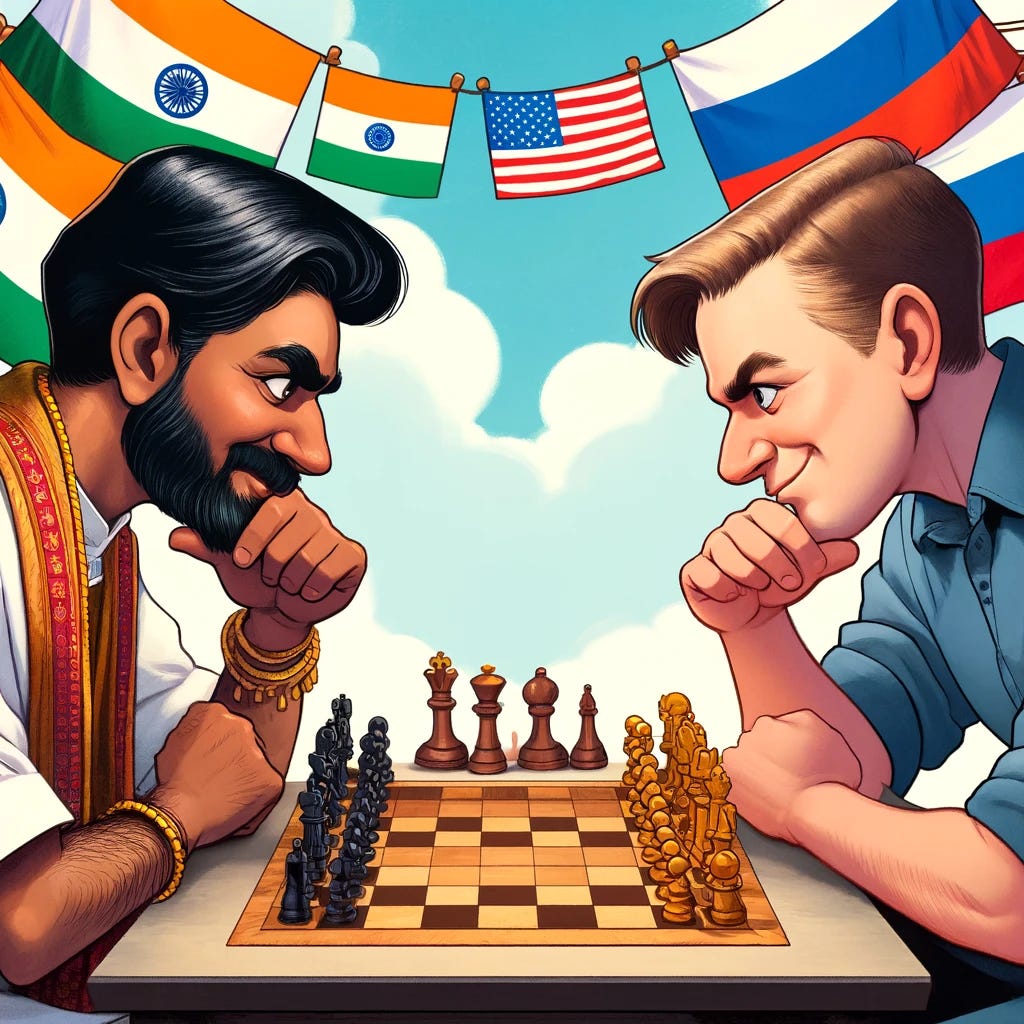Prince's Gambit Declined
The Politics of Chess: The Crown Prince (Yuvraj), Kasparov, and the Art of the Strategic Duel.
Prince's Gambit Declined
In the grand chessboard of Indian politics, where every move and countermove could change the fate of the nation, the Congress Party leader, Rahul Gandhi likened his electoral strategy to a high-stakes game of chess, asserting the need to think six or seven moves ahead. This chessboard analogy swiftly tickled the Twitterati, sparking a jest that even grandmasters like Garry Kasparov and Viswanathan Anand were fortunate never to face such a daunting adversary as Gandhi across the chess table. This witty remark caught the attention of Kasparov himself, now a naturalized US citizen and keen observer of global politics, who couldn't help but contribute his own playful retort to the mix, adding a sprinkle of grandmaster flair to the bubbling political pot.
Chess and Politics How they are Alike?
Chess and politics share a fascinating symmetry, both demanding a high caliber of strategy and foresight. In these arenas, every move and countermove is critical, each decision can shift the balance of power, and players must continually anticipate the actions of their opponents. Just as a chess grandmaster studies the board and plans several steps ahead, a skilled politician must navigate the complex landscape of public opinion, policy decisions, and international relations with similar acumen. Both fields are intellectual battlegrounds where the sharpness of the mind can outplay the might of the majority, illustrating that power, whether on a chequered board or in the halls of Parliament, often hinges on thinking two steps ahead of your opponents.
1. Strategic Depth
Much like a chess grandmaster, a seasoned politician must anticipate the consequences of their moves well in advance. Each policy, alliance, and public statement is a move that could either fortify their position or leave them vulnerable to a checkmate. Rahul Gandhi’s analogy wasn’t far off; in both arenas, the deep analysis of opponents' potential responses is crucial for survival and eventual triumph. The playful jab from Garry Kasparov, the former World Chess Champion and vocal anti-Putin activist, highlights this: "Traditional dictates that you should first win from Raebareli before challenging for the top!" This was his tweet during a particularly spicy exchange, poking fun at the political heavyweight without stepping into the ring— or shall we say, onto the board— himself.
2. Sacrificial Gambits
In chess, sacrificing a piece can open up advantageous positions or lead to a swifter victory. Similarly, politicians occasionally have to make concessions or sacrifices—be it unpopular decisions or temporary retreats—to achieve a greater objective. The art of giving up to gain is as prevalent in the corridors of power as it is on the checkered board. Kasparov's follow-up tweet tried to soften the earlier blow: "I very much hope my little joke does not pass for advocacy or expertise in Indian politics! But as an 'all-seeing monster with 1000 eyes,' as I was once described, I cannot fail to see a politician dabbling in my beloved game!" This clarifies his position as a commentator from the sidelines, musing on the curious interplay of chess and politics.
3. Endgame Vision
Every chess player enters the game with an endgame in mind, planning several moves ahead to ensure victory. In politics, the vision might span across electoral cycles, aiming for long-term benefits and sustainable impact. Both require a clear end strategy, albeit often obscured by immediate skirmishes on the board or in the poll rallies.
4. The Value of Pawns
In both chess and politics, the seemingly insignificant pawns can turn the tide of the game. Grassroots workers in politics and pawns in chess may start off as minor elements, but as the game progresses, their importance becomes evident, sometimes even becoming the key to victory.
5. Defensive Play
Just as in chess, where defensive strategies like the Sicilian Defence can provide robust protection, political figures often adopt a defensive stance to safeguard their position against attacks. The ability to defend effectively is as revered in political debates as it is in chess tournaments.
Chess and Politics How they are Different?
However, despite the apparent similarities, the realm of politics diverges from the disciplined game of chess in several fundamental ways:
1. Rules and Regulations
Chess is governed by a universal set of rules that all players must adhere to, ensuring a level playing field. Politics, contrastingly, can sometimes be the wild west, with rules bent and the goalposts moved. The clarity and fairness of chess are not always mirrored in the political arena.
2. Emotional Play
Chess is a game of logic and strategy, devoid of emotion. Politics is rife with emotional appeals and sentiments that deeply influence voter behavior and decision-making. The heart has as much a role as the head, unlike in the clinical precision of chess.
3. The Stakes
While losing a game of chess might bruise one's ego, political defeats can affect the lives of millions and lead to significant socio-economic changes. The stakes in politics extend far beyond those of any board game.
4. Public Scrutiny
Chess players are judged by their skill level and game outcomes, usually observed by a niche community. Politicians, however, operate under relentless public and media scrutiny, affecting not just their game but also their personal lives.
5. Unpredictability
Chess involves two players, and while surprises and turnarounds are part of the game, the variables are controlled and known. Politics is played on a much larger and unpredictable field, with numerous players, each capable of changing the game’s dynamics overnight.
Summing Up
As the election season approaches, it's essential to remember that, unlike chess, politics is rarely just black and white. It's a spectrum of grays, where moves are made in shades of compromise and alliance rather than straightforward wins and losses. So, here's to hoping all players remember the ethos of a fair game, even when the board seems endlessly complex. Let's play it right, not just smart.





Interesting article !!
Did not know your interest in chess ♟️
There is king's Gambit and more popularly Queen's Gambit declined !
Did not know Prince declining Queen's Gambit !!
Garry Kasparov is arguably the finest player ever to have played the game probably even better than the legendary Casablankas ,Bobby Fischers and Tigran Petrosians of the game 🎯